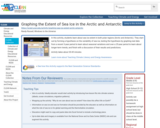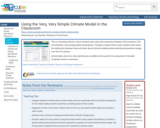
In this activity, students learn about sea ice extent in both polar regions (Arctic and Antarctic). They start out by forming a hypothesis on the variability of sea ice, testing the hypothesis by graphing real data from a recent 3-year period to learn about seasonal variations and over a 25-year period to learn about longer-term trends, and finish with a discussion of their results and predictions.
- Subject:
- Applied Science
- Career and Technical Education
- Environmental Science
- Environmental Studies
- Oceanography
- Physical Science
- Material Type:
- Activity/Lab
- Provider:
- CLEAN: Climate Literacy and Energy Awareness Network
- Provider Set:
- CLEAN: Climate Literacy and Energy Awareness Network
- Author:
- Randy Russell
- Windows to the Universe
- Date Added:
- 06/19/2012
